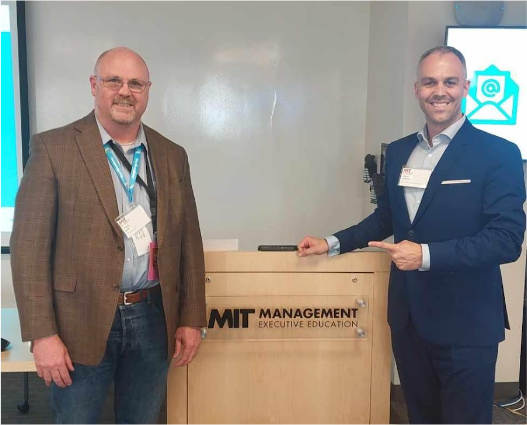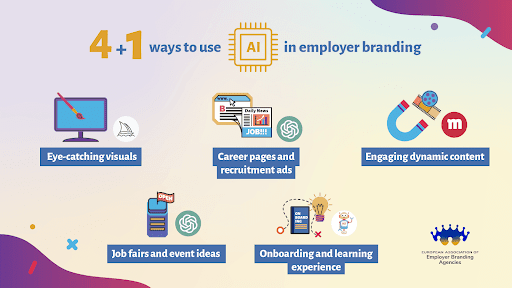Adam Horvath: Paul, we’re heading into exciting times for the employer branding industry. Many HR leaders are discussing the future impact of AI on the candidate experience and onboarding journey. Why do you believe HR leaders should become increasingly familiar with this technology?
Paul Baier: Generative AI tools like ChatGPT, Bard, and others are absolutely transforming the processes for HR professionals, employees and candidates. Candidates are using ChatGPT to customize resumes, cover letters, and generate automated interview question based on roles. HR professionals are using ChatGPT create job descriptions, interview evaluation sheets, and draft HR policies. Employees are using ChatGPT to write performance reviews.

Adam: So AI is spreading at the speed of light. Why can we be certain that this technology will not become the next big bubble to burst? We have previously encountered such forecasts concerning crypto encryption and the metaverse, just as digital transformation, big data, and machine learning have become integral parts of most companies’ operations. Is it possible that in 6 months we might find ourselves discussing the fading of the AI narrative with a new hype on the horizon?
Paul: ChatGPT is fundamentally different than previous tech hype cycles. Generative AI is the fourth digital revolution in the past five decades: following the progression of PCs, the internet, and smartphones. This technology is reshaping industries across the globe. Generative AI has already demonstrated its potential to revolutionize the way we work, communicate, and solve complex problems.
Adam: What areas of use do you see for AI in the field of employer branding? How will our content be transformed? Could our job advertisements and career pages be enhanced? How can AI help companies boost their visibility and attractiveness in the job market through content production?
Paul: Generative AI involves a whole set of input-to-output modes: Text-to-text (ChatGPT, Bard, Bing, etc.), text-to-image (Midjourney, DALLE2, etc.), picture-to-text (ChatGPT), text-to-video (for example Runway). These, alongside other generative AI tools radically lower the cost structure for content creation and democratize access to advanced image and video. This unleashes a torrent of creativity and cost-effective, hyper personalization in the next 12 months revolutionizing how companies engage with their audience and attract talent.

Adam: Sounds exciting! And if we look at the processes? What changes can artificial intelligence introduce to the process of selecting and onboarding new colleagues
Paul: Onboarding, particularly in industries with lots of regulation, will experience a significant transformation. For instance, comprehensive PDF documents outlining company HR processes, training, policies, and job details can be uploaded and new employees ask conversational questions in text or audio format. These questions may range from mundane queries (for example: does my office reimburse for public transportation?) to more strategic ones (for example: does my company have a career rotation program across multiple countries?).
Adam: I am glad that you brought this up, because we already beta tested our AI driven onboarding chatbot, Fizzabell. The chatbot was developed in a partnership with Cheppers in Budapest and operates exactly with the same focus: helping employees in large organizations with quick and simple answers.
Do you have a specific company example that you would like to share with us? Have you come across an example of companies leveraging AI to improve the workplace
Paul: I can provide dozens of examples. Teams and employees have used ChatGPT to design a customized summer internship program, develop company-specific generative AI training programs, facilitate the translation of HR policy manuals into 15 languages, etc. The list is long, and most of the solutions will come only after that, every day we will come across more and more creative solutions from the world of HR.
Adam: Excited period ahead of us in HR. I have one final question: if someone is reading this interview as a leader engaged in employer branding, what first step would you recommend? How can one become familiar with the technology? Perhaps begin by crafting a job advertisement with ChatGPT? :)
Paul: The question isn’t whether AI will take your job. Your job will be taken by someone who knows how to use AI. Top talent will only stay or join a company that wholeheartedly embraces generative AI. Highly talented employees have all realized that Generation AI is the largest career accelerator ever. Leaders who don’t understand this reality risk losing the ability to attract and retain of top talent in key positions within 12 months.
4+1 ways to use AI in employer branding
Whether it's adding some extra sparkle to your social media visuals, optimizing call-to-actions in your ads or career page, or enhancing the onboarding and learning experience for employees, the possibilities with AI in employer branding are more extensive than you might imagine. Here are 4+1 tangible methods already in practice at Brandfizz Employer Branding for our clients:
- Craft eye-catching visuals for social media job ads using MidJourney.
- Maximize candidate conversion with refined call-to-actions on career pages and ads through ChatGPT.
- Transform videos into engaging dynamic content across multiple online channels using GetMunch.
- Create interactive gamification activities for job fairs and events using Chat GPT.
+1 Elevate onboarding and learning experience for employees through an internal AI chat hub for all e-learning materials.